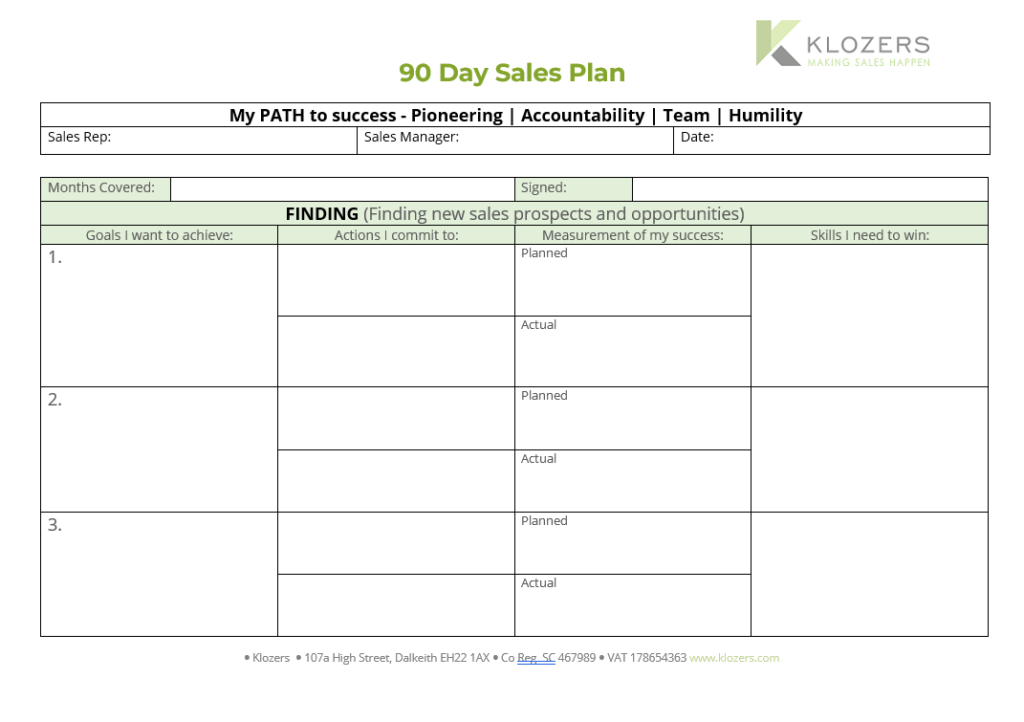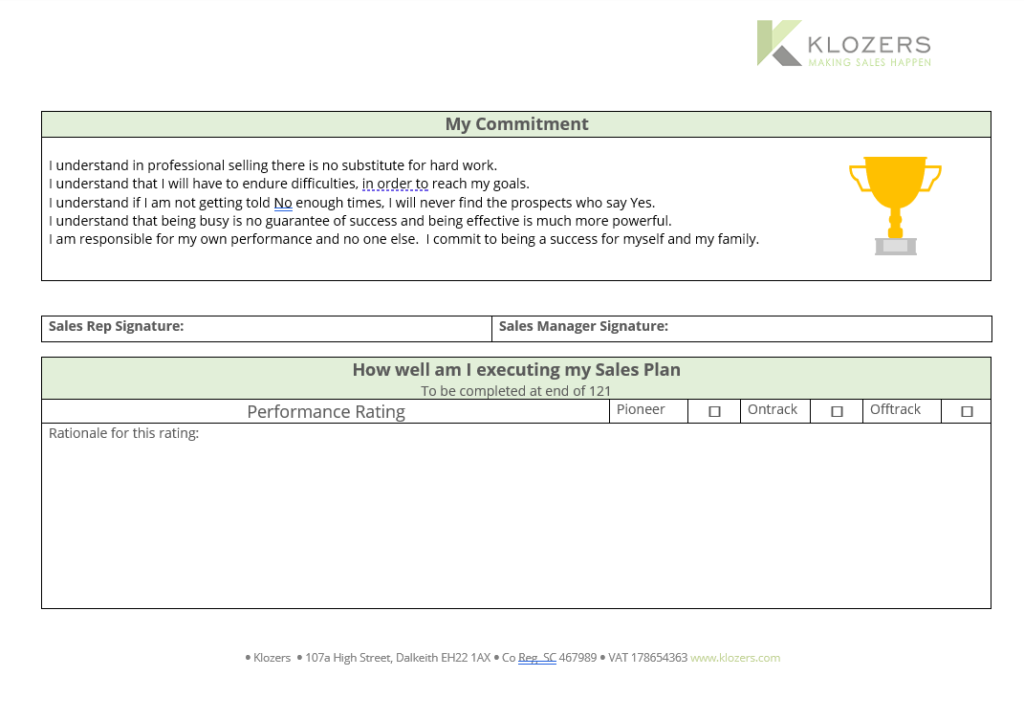There’s a new way to deliver sales growth…
Don’t buy Sales Training until you’ve watched this video…

Here’s the short answer: To write a 90-day sales action plan, your sales team should follow these steps:
Top tip: include the four high value areas of sales (Finding, Klozing, Growing and Developing) in your sales plan to ensure you allocate the right amount of time for your circumstances. For example some salespeople may need to focus on generating new leads, whilst others need to develop relationships with existing customers. Check out the FREE template below as an example of this.
Don’t buy Sales Training until you’ve watched this video…
Download a FREE copy of our 90 Say Sales Plan template and make this your sales year.

90-day sales plans are important because they provide a clear, focused framework for sales reps to work towards specific goals and objectives over a defined period of time. A well-crafted 90-day sales plan can help the entire team to:
Overall, a 90-day sales plan is a valuable tool that can help sales reps to focus their efforts, track their progress, and stay motivated and accountable as they work towards specific goals and objectives.
A 90-day sales plan for a sales manager will be different from a 90-day sales plan for a salesperson, as the responsibilities and goals of the two roles differ.
For a sales manager, a 90-day sales plan may focus on goals such as improving team performance, increasing team productivity, improving the sales skills of the team, or building relationships with key clients.
It may also include tasks such as conducting performance evaluations, providing training and development opportunities for team members, or creating strategies to target new markets.
90 day plans are a great tool to help new sales managers to demonstrate an impact in a new position. In addition to their management responsibilities many new sales managers also have a sales quota and are directly responsible for a few strategic clients.
For a salesperson, a 90-day sales plan may focus on goals such as increasing sales revenue, closing new deals, or improving customer retention. It may also include tasks such as identifying and qualifying leads, making presentations, or following up with prospects and customers.
Like the salespeople’s 90 day plans, the sales managers plans should always be linked to the company’s overall business plan and sales strategy.

Sales plans should always be created by the salespeople who are responsible for executing the plan even when they are new sales reps to the company.
Here are a few factors to consider when creating your 90-day sales plans:
a) Modern sales management is an extremely busy role and creating action plans for every member of your team takes time because of the variables involved.
b) Where new hires lack the skills or experience to create their own 90 day plans, sales managers should use the planning process to help train and coach their direct reports to be more self sufficient.
The sales manager should always be involved as they ultimately have to sign off the plans. However, giving responsibility to the salespeople, helps build their skills and more importantly give them a sense of ownership of the plan, which in turn provides better engagement across the team.
The goals and objectives in a 90-day sales plan should be aligned with the company’s overall sales strategy. Your sales strategy is your long-term plan that outlines the approach and tactics that your company will use to achieve its sales goals. By aligning the goals and objectives of the 90-day sales plan with the overall sales strategy, sales reps and sales managers can ensure that they are working towards the same overall goals and objectives as the company.
Here are a few ways to align the goals and objectives in a 90-day sales plan with the company’s sales strategy:
Identify the measurable goals of the company: The first step in aligning the 90-day sales plan with the company’s sales strategy is to understand the overall sales goals of the company. These may include goals such as increasing sales revenue, expanding into new markets, or improving customer retention.
Determine how the 90-day sales plan fits into the overall strategy: Once you have identified the overall sales goals of the company, you can determine how the 90-day sales plan fits into the overall strategy. This may involve identifying specific tactics or approaches that the team can use to contribute to the overall sales goals.
Use OKRs to set goals: The OKR system is a business goal setting framework used by many companies to drive growth and improvements. We use this in our own business and with our clients who love it.
Overall, aligning the goals and objectives in a 90-day sales plan with the company’s sales strategy can help sales reps and sales managers to work towards the same overall goals and objectives as the company, and contribute to the success of the overall sales strategy.

Salespeople can be a tough audience and they especially don’t like change or something they feel threatening. This is why it’s so important to take a collaborative approach and make sure you win their hearts as well as their minds. This is as much about Change Management as it is about sales.
With that in mind, facilitate a workshop and with your team:
Remember the most powerful workshops are those where the salespeople get to talk, are heard and believe its their own ideas they are about to go out and execute.
A culture of accountability is essential for any business to be successful and all sales plans are worthless unless they are delivered. If you are introducing sales plans for the first time you should set the activity bar low so it’s achievable. You can gauge this by the activity level of the top performer and by using them as a benchmark you can immediately remove the argument that it cannot be done because everyone is too busy.
Communicate the plan clearly: Make sure that the salespeople understand their goals and the specific tasks that they need to complete in order to achieve them. Clearly communicate deadlines and priorities, and provide any necessary resources or support to help them succeed.
Set up regular check-ins: Schedule regular check-ins with sales team members to review their progress and provide support and guidance as needed. These check-ins can be conducted in person, over the phone, or via video conference.
Track progress and review results: Use tools such as dashboards or performance tracking software to track the progress of sales team members towards their goals. Regularly review these results to identify areas where team members are falling behind, and provide additional support as needed.
Provide feedback and coaching: Offer constructive feedback, training and coaching to sales team members to help them improve their performance and achieve their goals. This can include providing guidance on best practices, identifying areas for improvement, and offering support and resources to help team members succeed.
Set consequences for non-compliance: Establish clear consequences for sales team members who are not meeting their goals or following the plan. These consequences could include additional training or coaching, reduction in commissions or bonuses, or even termination if necessary.
The art of sales management is to push your sales force, however, if you push too hard you will lose them mentally. Better still link their personal goals to your business goals and watch them push themselves.
Be sure to get include a “Commitment Statement” in your plan and get your Reps to read it an sign it. This is great for setting the scene and reminding them that they are responsible for their own results.

A 90-day sales action plan for a new salespeople should be very different to this 90-day sales action plan which is designed for existing salespeople. In most cases the hiring manager will use the first 30 days to provide what we call non sales training to a new sales rep. As part of the initial onboarding and training process a new employee would be given training on the new company’s vision, the company’s mission, product training and industry knowledge,
Next up during the 60 – 90 day sales plan the training quickly focuses more on sales knowledge topics. This should include, the value proposition, target markets, generating new leads and key clients that need to be prioritised.
Here are some additional things you should consider for new sales team members:
Focus: A 90-day sales action plan for those in a new sales job should focus more on onboarding and training, while a 90-day sales action plan for existing salespeople, may focus more on specific goals and objectives. For example, new sales team members will need more support understanding their sales territory, the sales process, background to any key accounts they are taking over.
Tasks: A 90-day sales action plan for new hires may include tasks such as learning about the company’s products and services, meeting with key stakeholders, and observing sales calls, while a 90-day sales action plan for existing salespeople may include tasks such as making presentations, following up with leads, and closing deals.
Goals: A 90-day sales action plan for new hires may include goals such as becoming familiar with the sales process and building relationships with key stakeholders, while a 90-day sales action plan for existing salespeople may include goals such as increasing sales revenue or improving customer retention. It’s important that every new sales rep understands how the company defines success and
Overall, the focus and tasks included in a 90-day sales action plan may vary depending on the specific needs and goals of the sales team or individual, as well as their experience and expertise in sales. It is important to choose goals and tasks that are specific, measurable, achievable, relevant, and time-bound (SMART) in order to maximize the chances of success. This includes weekly personal goals, following the companies sales processes, and producing high quality work that measurably impacts their sales quota.rep
“A fantastic learning experience”

Iain Swanston has spent over 30 years in B2B sales selling, training and leading teams both domestically and internationally. In addition he serves as an Associate at Strathclyde University Business School where he has delivered the sales content for the Masters in Entrepreneurship since 2015.
124 City Road,
London,
EC1V 2NX.
8911 North Capital of Texas Highway, Suite 4200 #1154
Austin, TX 78759
United States
Klozers
Ground Floor
470 St Kilda Road
Melbourne VIC
3004